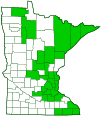Baltimore Checkerspot
(Euphydryas phaeton)
Conservation • Description • Habitat • Ecology • Distribution • Taxonomy
|
|
|||||||||||||
Description |
Baltimore Checkerspot is a geographically variable, medium-sized butterfly. It is the official state insect of Maryland. Adults have a wingspan of 1¾″ to 2¾″. The upper side of both wings is black with orange marginal spots, 2 or 3 rows of white submarginal spots, and a few to several median orange spots and white spots. In flight it looks mostly black. The underside of both wings is black with orange marginal spots, four rows of submarginal white spots, then four alternating median rows of orange and white spots. The club at the tip of the antenna is bright orange. The caterpillar is up to 1¾″ long, orange-and-black striped, and spiny. The head and the first and second thoracic segments are black. The first eight abdominal segments each have a broad orange band and two narrow sets of alternating black and orange bands. Each broad orange abdominal band has several black, branched spines (scoli). The branches of the scoli are hair-like and nearly as long as the scolus is tall. The ninth and tenth abdominal segments are black. |
Size |
Wingspan: 1¾″ to 2¾″ |
Similar Species |
Harris’ checkerspot (Chlosyne harrisii) caterpillar is similar but has more orange on the second thoracic segment and the ninth abdominal segment. The branches of the scoli are needle-like and are less than half as long as the scolus is tall. |
Habitat |
Marshes, wet meadows, bogs, and swamps |
Ecology |
Season |
One brood from mid-June to early August |
Behavior |
|
Life Cycle |
In the spring the female lays a group of 100 to 700 eggs on a leaf of a host plant. The hatched larvae move to the tip of the plant and create a silky web. They feed within the web, expanding it downward as the season progresses and more of the plant is consumed. In August they spin a compact, pre-hibernation web and stop eating. In October they leave this nest and descend to the ground as a group. On the ground they split into smaller groups. Each small group constructs a hibernating web from dead grass, leaves, and other debris in which they will spend the winter. |
Larva Hosts |
First-stage larvae: White turtlehead (Chelone glabra) and English plantain (Plantago lanceolata). Fourth-stage larvae: A wider variety of plants including ash (Fraxinus spp.), viburnum (viburnum spp.), honeysuckle (Lonicera spp.), and those species listed above. |
Adult Food |
Flower nectar of shrubby cinquefoil (Dasiphora fruticosa floribunda), spreading dogbane (Apocynum androsaemifolium), black-eyed Susan (Rudbeckia hirta), milkweed (Asclepias spp.), viburnum (viburnum spp.), and rose (Rosa spp.). |
Distribution |
||
|
Sources |
|
| 6/18/2029 | ||
Occurrence |
||
|
||
Taxonomy |
|
Order |
|
Superfamily |
Papilionoidea (Butterflies) |
Family |
|
Subfamily |
Nymphalinae (Checkerspots, Anglewings, Peacocks, and Allies) |
Tribe |
Melitaeini (Checkerspots) |
Subtribe |
Euphydryina |
Genus |
Euphydryas |
Subordinate Taxa |
|
|
|
Synonyms |
|
Euphydryas phaetana Euphydryas schausi Melitaea phaethusa Melitaea phaeton Melitaea phaetontea |
|
Common Names |
|
Baltimore Baltimore Checkerspot |
|
Glossary
Scolus
A spiny, branched projection from a larval body wall, the branches terminating with a single stiff, hair-like or bristle-like tip.
Visitor Photos |
||
Share your photo of this insect. |
||
This button not working for you? |
||
Tom Baker |
||
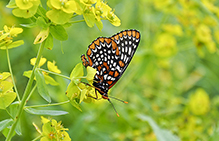 |
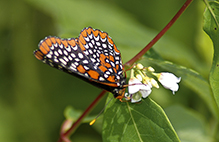 |
|
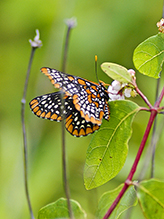 |
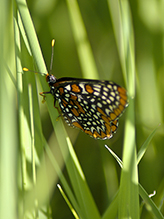 |
|
MinnesotaSeasons.com Photos |
||
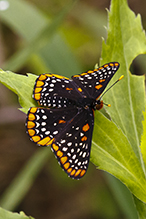 |
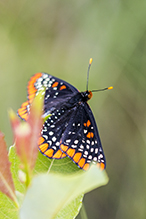 |
|
Upper side |
Upper side |
|
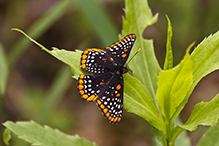 |
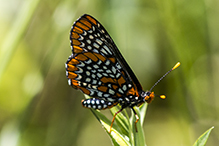 |
|
Upper side |
Underside |
|
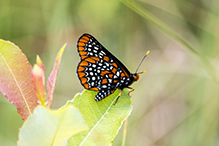 |
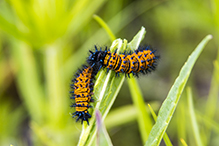 |
|
Underside |
Caterpillar |

Slideshows |
Euphydryas phaeton (Baltimore Checkerspot) |
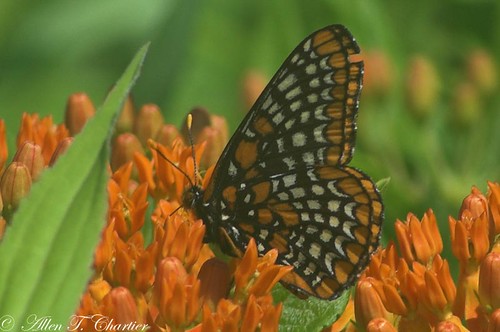
|
Baltimore Checkerspot butterfly |
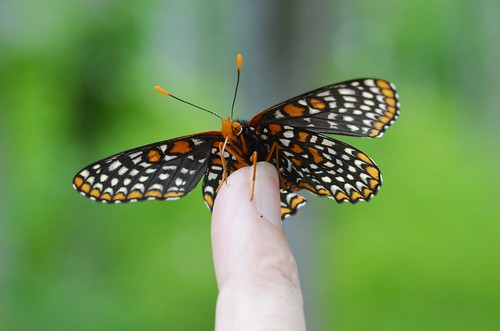
|
Baltimore Checkerspot |
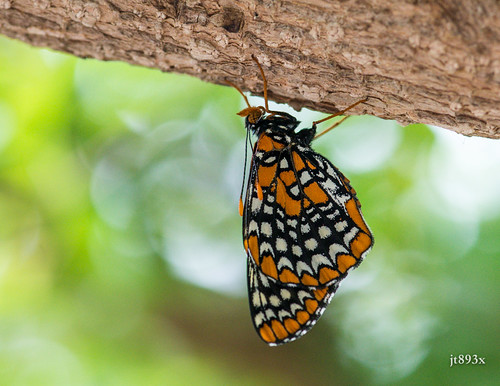
|

Visitor Videos |
||
Share your video of this insect. |
||
This button not working for you? |
||
|
Other Videos |
||
Euphydryas phaeton oviposition |
About
Published on Jul 6, 2012 Egg laying mami |
Baltimore Checkerspot Butterfly |
About
Uploaded on Jun 14, 2011 At the Bluff Spring Fen in Elgin, Illinois on June 10, 2011. I recently learned that this butterfly is somewhat uncommon in northern Illinois. One of my favorite subjects. It is only around for a few weeks, generally mid-June. |
Baltimore Checkerspot Butterfly on June 8, 2012 |
About
Published on Jun 10, 2012 video captured at the Bluff Spring Fen Nature Preserve in Elgin, Illinois. This is the time of year when these butterflies start to roam. But only for a few weeks. This location is a reliable spot to see this species. |
Baltimore Checkerspot Butterfly |
About
Uploaded on Jun 12, 2011 video taken at the Bluff Spring Fen Nature Preserve, in Elgin, Illinois. This specimen was feeding at this coneflower for well over the 9 minutes of video that I collected. I've distilled that down to a couple of minutes. |
Baltimore Checkerspot Butterfly on a Black-eyed Susan Flower |
About
Uploaded on Jun 29, 2011 A Black-eyed Susan has the attention of one of the Baltimore Checkerspot Butterflies at the Bluff Sprign Fen in Elgin, Illinois. I've already posted one video of the Baltimore Checkerspot this year. But catching one working a flower was too good to pass up. |

Visitor Sightings |
||
Report a sighting of this insect. |
||
This button not working for you? |
||
|
|
MinnesotaSeasons.com Sightings |
||

Created: 10/8/2012 Last Updated: © MinnesotaSeasons.com. All rights reserved. |
